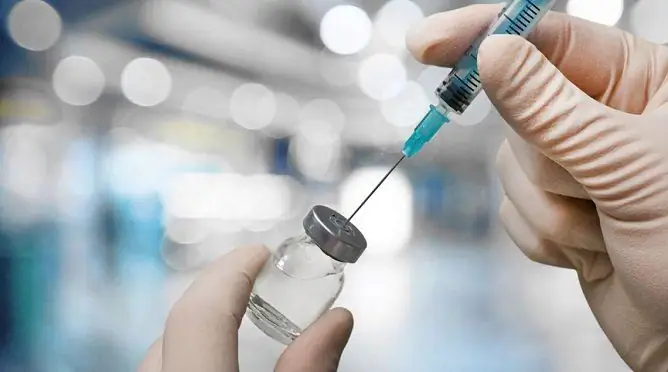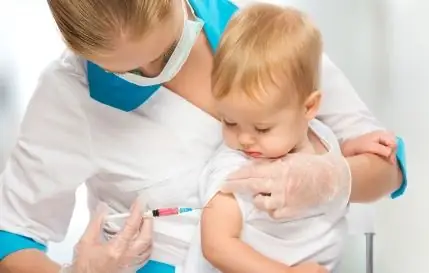- Author Rachel Wainwright wainwright@abchealthonline.com.
- Public 2023-12-15 07:39.
- Last modified 2025-11-02 20:14.
Engerix B
Latin name: Engerix B
ATX code: J07BC01
Active ingredient: HBS-protein - the main surface antigen of the hepatitis B virus (HBsAg) [HBS-interdum est consectetur superficiem antigen of hepatitis B virus (HBsAg)]
Producer: GlaxoSmithKline Biologicals (Belgium)
Description and photo update: 2018-11-09

Engerix B is a vaccine to prevent hepatitis B.
Release form and composition
The drug is produced in the form of a suspension for injection for children and a suspension for injection for adults: homogeneous, slightly opalescent, whitish; during storage, it is divided into two layers - a colorless transparent liquid and a white precipitate, which, when shaken, easily breaks down [in vials of 1 dose (0.5 ml - for children, 1 ml - for adults), in a cardboard box 1 bottle and instructions for use Engerix B; for hospitals - 25 or 100 bottles in a cardboard box; in multi-dose vials of 10 doses (5 ml - for children, 10 ml - for adults), in a cardboard box 1 bottle, in a cardboard box 25 or 100 bottles].
Composition of 1 dose of the vaccine:
- active substance: HBS protein, which is the main surface antigen of the hepatitis B virus (HBsAg) - 10 μg (0.5 ml) or 20 μg (1 ml);
- auxiliary components: merthiolate (in trace amounts), sodium hydrogen phosphate dihydrate, sodium chloride, sodium dihydrogen phosphate dihydrate, water for injection, aluminum hydroxide (adsorbent).
The Angerix B vaccine meets the requirements of the World Health Organization. It is highly purified and contains no preservatives. In its production, no substances derived from the substance of the human body are used.
Pharmacological properties
Pharmacodynamics
Engerix B is a vaccine used to prevent hepatitis B. It is a purified main surface antigen of hepatitis B virus - HBsAg, which is produced by a culture of yeast cells (Saccharomyces cerevisiae) obtained by genetic engineering and having a gene encoding the main surface antigen of hepatitis B virus. HBsAg is obtained using recombinant DNA, purified from yeast cells by several sequentially applied physicochemical methods, and adsorbed on aluminum hydroxide.
HBsAg spontaneously transforms into spherical particles with a diameter of 20 nm containing non-glycosylated HBsAg polypeptides and a lipid matrix consisting mainly of phospholipids. Studies have found that these particles have properties characteristic of natural HBsAg.
The prophylactic efficacy of the Angerix B vaccine is 95-100% in infants, children and adults at risk.
The vaccine induces the formation of specific HBs antibodies, which in a titer of 10 IU / L prevent the development of hepatitis B.
The prophylactic efficacy of Angerix B in newborns born to HBsAg positive mothers and vaccinated on a schedule of 0, 1, 2, 12 months or 0, 1, 6 months without simultaneous or subsequent administration of anti-HBV immunoglobulin (HBIg) is 95%. Concomitant use of HBIg at birth increases efficacy by up to 98%.
When healthy newborns are immunized according to the scheme 0, 1, 6 months, 7 months after the introduction of the first dose of the vaccine, the protective level of antibodies is determined in more than 96% of the vaccinated. If immunization is carried out according to the scheme of 0, 1, 2, 12 months, 15% of the vaccinated have a protective level of antibodies 1 month after the introduction of the first dose, and 89% of patients 1 month after the third dose. One month after the fourth vaccination, the protective antibody titer is determined in 95.8% of individuals.
When vaccination is carried out according to the scheme 0, 7, 21 days, the protective titer of antibodies 1 week after the introduction of the third dose is determined in 65.2% of the vaccinated, 5 weeks after the third vaccination - in 76% of persons. One month after the fourth vaccination, which is administered 1 year after the main immunization schedule, a protective antibody titer is detected in 98.6% of the vaccinated.
As a result of mass vaccination of children aged 6-14 years, there was a significant decrease in the frequency of persistence of the hepatitis B antigen, which is an important factor in the development of liver cancer, and the occurrence of hepatocellular carcinoma.
With concomitant renal failure, including in patients on hemodialysis, seroprotective levels (calculated as the percentage of patients in whom the target antibody titer value has reached> 10 IU / L) after vaccination according to the scheme 0, 1, 2, 6 months (40 μg / 2 ml) are: after 3 months - 55.4%, after 7 months - 87.1%.
Engerix B also has the ability to prevent hepatitis D infection when coinfected with a delta agent.
Pharmacokinetics
Pharmacokinetic data for Angerix B were not provided by the manufacturer.
Indications for use
Engerix B is used for active immunization of children and adults against hepatitis B, primarily those at risk of infection.
The vaccine is administered in accordance with the National Calendar of Preventive Vaccinations and the Calendar of Preventive Vaccinations for epidemic indications for all population groups not previously vaccinated.
Groups at risk of contracting viral hepatitis B include:
- children born to mothers who are carriers of the hepatitis B virus;
- children living in orphanages and boarding schools;
- medical and dental staff, including clinical and serological laboratory staff;
- persons engaged in the production of immunobiological preparations from donor and placental blood;
- medical students (especially graduates);
- people living in regions where hepatitis B is endemic;
- people traveling to regions where hepatitis B is endemic;
- persons who have close contact with patients with acute or chronic hepatitis B or with carriers of the virus;
- patients with chronic liver disease or at risk of developing liver disease (including patients with chronic hepatitis C, hepatitis C virus carriers and alcohol abusers);
- patients undergoing or planning invasive medical or diagnostic procedures, surgery, organ transplantation, transfusion of blood or blood components;
- patients with sickle cell anemia;
- drug addicts who inject drugs;
- persons who are at increased risk of the disease due to their sexual behavior (promiscuous sex life, homosexuality).
In areas with a moderate to high incidence of hepatitis B, the risk of infection is high in the entire population, so vaccination is also recommended for all children, including newborns and adolescents.
Contraindications
- development of hypersensitivity reactions to the previous administration of the hepatitis B vaccine;
- hypersensitivity to any component of Engerix B (including baker's yeast).
Engerix B, instructions for use: method and dosage
Engerix B is administered deeply intramuscularly (IM). Recommended injection sites: neonates and young children - anterolateral thigh area, adults and older children - deltoid area. Patients with diseases of the blood coagulation system (for example, thrombocytopenia), as an exception, are allowed to administer the vaccine subcutaneously.
It is not recommended to inject the suspension into the gluteus muscle, intradermally or subcutaneously, since an adequate immune response will not be achieved with this route of administration.
Intravenous vaccine administration is strictly prohibited.
Immediately before use, the bottle must be shaken thoroughly until the suspension acquires a homogeneous structure of a slightly dull whitish color without foreign particles. If the vaccine looks different, it is prohibited to use it.
When using a multi-dose vial, each dose should be withdrawn and injected with a new sterile syringe with a disposable sterile needle. After opening such a bottle, the vaccine should be used during the working day.
Medical personnel must draw the vaccine into a syringe under strictly aseptic conditions, taking precautions to prevent contamination (contamination) of the contents.
Recommended doses:
- children under 16 years old, including newborns - 10 μg / 0.5 ml;
- adolescents from 16 years old and adults - 20 μg / 1 ml.
Primary vaccination
Standard vaccinations are given on a 0, 1 and 6 month schedule. Optimal protection under this scheme is provided at 7 months.
Accelerated vaccination is carried out according to the scheme 0, 1 and 2 months, 12 months after the first vaccination of Angerix B, revaccination is carried out. This schedule provides a faster immune response and greater adherence to vaccination.
Emergency vaccination can be carried out for persons over 16 years of age in exceptional cases when a rapid development of a preventive immune response is required, for example, when planning a trip to a hyperendemic area. Vaccinations are done according to the scheme 0, 7, 21 days. Revaccination is performed 12 months after the first dose.
Primary vaccination of hemodialysis patients with impaired renal function:
- patients aged 16 years and older: 4 vaccinations in double doses (40 μg) according to the scheme of 0, 1, 2 and 6 months. The physician should consider the appropriateness of performing serological tests after immunization. The vaccination schedule can be adjusted to provide an antibody titer of ≥ 10 IU / L (acceptable protective level);
- patients under the age of 16, including newborns: use a standard or accelerated vaccination schedule at a dose of 10 μg / 0.5 ml. Serologic testing after immunization is recommended. Given the evidence in adults, a double dose in children may result in a better immune response. The vaccination schedule can be adjusted to provide an antibody titer ≥ 10 IU / L (acceptable protective level).
Persons who are accidentally exposed to the risk of infection (for example, after a prick with an infected needle), it is recommended to carry out accelerated vaccination according to the scheme of 0, 1, 2 months + revaccination after 12 months. In this case, the first dose of Angerix B is administered simultaneously with immunoglobulin against hepatitis B (injections are performed in different parts of the body).
For newborns born to mothers who are carriers of the hepatitis B virus or have suffered hepatitis B in the third trimester of pregnancy, the first dose of Angerix B is recommended to be administered in the first 12 hours of life, then an accelerated vaccination schedule is used, since it allows a faster immune response to be achieved. If necessary, hepatitis B immunoglobulin is administered at the same time (injections are performed in different parts of the body). If necessary, the vaccination schedule can be adjusted by a doctor.
Revaccination
The need for revaccination has not been established in healthy individuals who have undergone a complete primary immunization scheme.
The need for revaccination in patients on hemodialysis and those with a reduced immune response is determined by the results of serological tests.
The tolerance of the revaccination is comparable to that of the primary vaccination.
Side effects
- local reactions: often (from> 1% to ≤ 0.1%) - redness, swelling and soreness at the injection site;
- on the part of the musculoskeletal system: rarely (from ≥ 0.01% to <0.1%) - arthralgia, myalgia; very rarely (<0.01%) - arthritis;
- on the part of the cardiovascular system: very rarely - hypotension, syncope, vasculitis;
- from the digestive system: rarely - abdominal pain, diarrhea, nausea, vomiting, changes in liver function tests;
- on the part of the respiratory system: very rarely - symptoms resembling bronchospasm;
- from the central and peripheral nervous system: rarely - paresthesia, dizziness, headache; very rarely - neuropathy, paralysis, encephalopathy, encephalitis, seizures, meningitis, neuritis (including optic neuritis, multiple sclerosis, Guillain-Barré syndrome);
- from the hematopoietic system: very rarely - lymphadenopathy, thrombocytopenia;
- allergic reactions: rarely - skin rashes, hives, itching; very rarely - anaphylactoid and anaphylactic reactions, limited acute angioedema, erythema multiforme, serum-like syndrome of drug allergy;
- on the part of the body as a whole: rarely - malaise, fever, weakness, flu-like syndrome.
The causal relationship of the development of the described adverse reactions with the introduction of Engerix B has not been reliably established.
Overdose
No cases of overdose of Angerix B have been reported to date.
special instructions
In the case of an acute febrile condition or exacerbation of a chronic disease, vaccination is carried out 1 month after complete recovery or the onset of remission.
If a patient is diagnosed with a mild infectious disease, the Angerix B vaccine can be given as soon as the body temperature has returned to normal.
Engerix B does not protect against infections caused by other pathogens (including hepatitis A, C, and E) or from pathogens that cause other liver diseases.
Vaccination should be carried out in the vaccination room, where all the necessary means are provided to stop the anaphylactic reaction. Severe allergic reactions usually develop immediately after the administration of the vaccine, therefore, the patient must be under medical supervision within 30 minutes after the injection.
The development of the immune response depends on many individual factors, therefore, if the vaccination is not effective, an additional dose of the vaccine may be required.
Additional vaccine administration may also be required for patients on hemodialysis and immunocompromised individuals (for example, HIV-infected), since an adequate titer of HBs antibodies may not be achieved after the main course of immunization.
The hepatitis B virus is characterized by a long incubation period, therefore, during the course of vaccination, the patient may already have a latent virus infection. In this case, immunization cannot prevent the development of the disease.
Influence on the ability to drive vehicles and complex mechanisms
Given the safety profile of Angerix B, it is unlikely to have a negative impact on the ability to perform potentially hazardous activities, including driving.
Application during pregnancy and lactation
There have been no experimental studies on the effect of Angerix B on reproductive function in animals, nor controlled studies on the use of the vaccine in women during pregnancy and lactation. This vaccine is inactivated (i.e., it does not contain live microorganisms), so the risk to the fetus / child is minimal.
Pediatric use
In pediatrics, the Engerix B vaccine is used when indicated.
With impaired renal function
Primary vaccination of hemodialysis patients with impaired renal function:
- age from 16 years: 4 vaccinations are given in double doses (40 μg) according to the scheme of 0, 1, 2 and 6 months. The physician should consider the appropriateness of performing serological tests after immunization. The vaccination schedule can be adjusted to provide an antibody titer of ≥ 10 IU / L (acceptable protective level);
- age up to 16 years, including newborns: use a standard or accelerated vaccination schedule at a dose of 10 μg / 0.5 ml. Serologic testing after immunization is recommended. Given the evidence in adults, a double dose in children may result in a better immune response. The vaccination schedule can be adjusted to provide an antibody titer ≥ 10 IU / L (acceptable protective level).
Drug interactions
Engerix B can be used concurrently with immunoglobulin against hepatitis B. If drugs are administered to different parts of the body, the titer of anti-HBs antibodies does not decrease.
Engerix B is allowed to be administered at the same time as other vaccines provided for in the National Vaccination Schedule and inactivated vaccines in accordance with the Epidemic Indication Vaccination Calendar. The main condition is that vaccines must be injected with different syringes in different parts of the body.
Engerix B can be used to complete an immunization course started with another hepatitis B vaccine, or to give a booster if needed.
Analogs
The analogs of Engerix B are: Regevak B, Hepatitis B recombinant vaccine (rDNA), Hepatitis B recombinant yeast vaccine, Shanvak-B, Hepatitis B recombinant vaccine.
Terms and conditions of storage
Store and transport at 2-8 ° C, free from freezing. Keep out of the reach of children.
The shelf life is 3 years.
Terms of dispensing from pharmacies
Dispensed by prescription.
Multi-dose packages are dispensed only to medical institutions.
Reviews about Angerix B
Reviews of Angerix B are positive. Patients describe the vaccine from the Belgian manufacturer as effective, well tolerated and not causing side effects. Unfortunately, as many note, in the vaccination offices they offer only the domestic vaccine against hepatitis B, which is worse tolerated, and it is very difficult to buy Engerix B on your own.
Price for Engerix B in pharmacies
The price for Engerix B is currently unknown, as the drug is not available commercially. The cost of the domestic analogue - Hepatitis B recombinant yeast vaccine is: 10 ampoules of 0.5 ml - 1541 rubles, 10 ampoules of 1 ml - 1902 rubles.

Maria Kulkes Medical journalist About the author
Education: First Moscow State Medical University named after I. M. Sechenov, specialty "General Medicine".
Information about the drug is generalized, provided for informational purposes only and does not replace the official instructions. Self-medication is hazardous to health!






